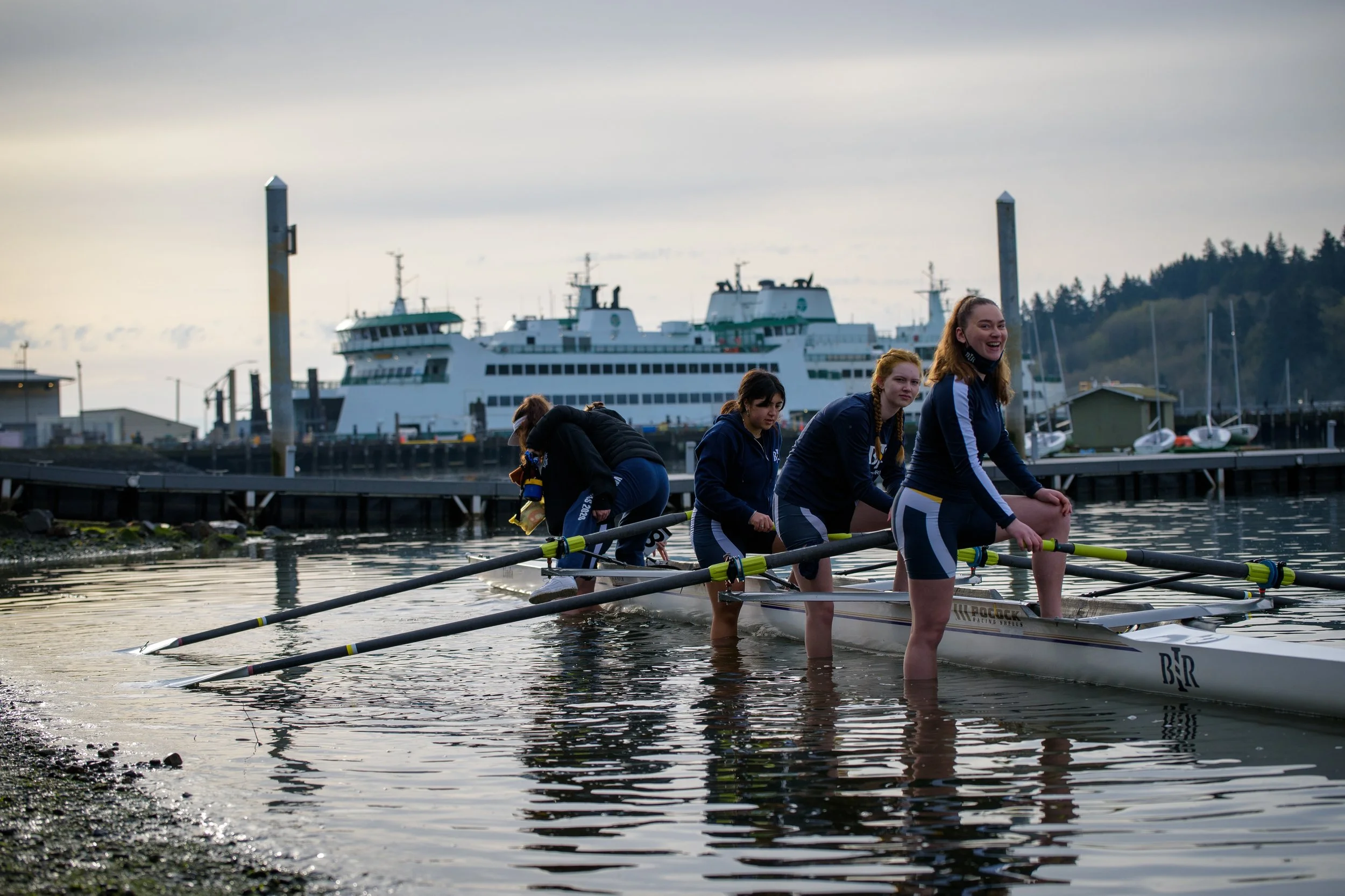pulling together
A new boathouse for the West Sound carries on a PNW legacy
Words by Sarah Lane
Bainbridge Island Rowing welcomes athletes of all backgrounds. (Photo: David Cohen)
The finishing touches on the Stan Pocock Legacy Rowing Center, the new home of Bainbridge Island Rowing (BIR), will be made early next year. When it’s finished, the two-story building will include boat and equipment storage, a repair workshop, changing rooms, office space, a conference room, a caterer’s kitchen, and a great room (with an unparalleled view of Eagle Harbor).
Though still a work in progress, the boathouse in Waterfront Park has already made good on its promise to bring together a diverse family under its 120-foot-long roof. That family includes the 200 or so junior and master team rowers and dozens more who partake each year in BIR’s Learn-to-Row program. It also includes the broader community who will be able to rent the great room for events, workshops and fitness programs.
The boathouse family ranges in age from 14 to 88. At the lower end is Liam Block, who is also the smallest. Measuring just five feet, Liam doesn’t fit the stereotypical rower image but packs a punch as coxswain. Liam says he has “a sense of satisfaction” when his team improves. “I try to make their experience better—it makes it more fun when the boat runs well.”
The oldest, Sigrid Knight, started rowing in 2010 when she ran into friends selling sno-cones to support the then brand-new rowing program. They convinced Knight, who had never rowed before, to join. Now 88, Knight says it was the best decision she ever made, referring to “the serenity and beauty of being on a boat.” But what she likes just as much as rowing is “the sense of everyone working together on the same goal,” building a boathouse for a team that started out on “a mound of dirt” at Waterfront Park.
That team unity pervades BIR. Recently, as Knight was carrying oars uphill from the water, she said out loud, “The day I can no longer carry the oars is the day I quit rowing.” A rower behind her immediately said, “The day you can no longer carry the oars is the day you call for help.”



Photos: Andrew Block
BIR often comes through on that promise of help. When recreational sculler Ian Becke developed a brain tumor that affected his balance, his teammates wanted to help him continue rowing. Rob Smallwood of Smallwood Design and Construction donated a stable wide-bottom, two-person skiff to BIR. Becke’s teammates rowed with him until he could no longer row, and then they met him at his home in Poulsbo for walks. After Becke died in March, BIR named the skiff the Ian Becke in his memory.
Rowing is one of the few Bainbridge school sports that accept participants from off island. The junior teams include teens from Suquamish, Indianola, Poulsbo and Kingston. Because of differing school schedules, the boathouse provides a sheltered space for students to hang out and do homework. Rising senior Meleana Hooper tried rowing last year since it was a sport open to her as an off-islander. Through BIR she’s met lots of great people she’s “proud to call friends and teammates. It didn’t matter to anyone that I started rowing as a junior. My coaches were very supportive, and I’ve found that I love to row.”
During COVID, rowing was one of only two local sports open to kids. BIR put junior rowers in single shells loaned by community members. Every kid rowed separately to avoid exposure.
The boathouse even facilitated a marriage. Chicagoan Beth Keegan first met Karen Mattock in Devon, England. The two started dating long distance. Three years ago, Beth moved to Bainbridge. Eventually, Karen did too and, like Beth, joined the BIR masters. It was at the boathouse that Jo Vander Stoep, head of the Learn-to-Row program, told the couple they should get married. Beth and Karen agreed to the “proposal,” and in 2019 they married at Waterfront Park right next to the still-incomplete building. Because by chance the marriage had been scheduled on the same day as BIR’s Dream Big fundraiser, the newlyweds spent their first married evening at the head table of the auction at Wing Point Golf Club, where they were introduced to 300 attendees.
Standing in the unfinished boathouse, Beth is proud and humbled to be part of the BIR family. Ten percent of BIR rowers are on scholarship, and the club fiercely sticks to its policy of never turning away a rower, regardless of ability to pay. Beth says, “The result of this practice is a diverse family bringing different skills and abilities to the boathouse.” She adds, “When someone who might not otherwise be able to row wants to be on the water, BIR makes that happen. That concept—of a welcoming family—is the heart of the place.”

